
(Most recent first. Click on the titles for fuller descriptions).
22nd November 2016
For our final meeting of 2016 we were taken on a photographic safari in Southern Africa by club member, Peter Donaldson. However, this was no ordinary safari because the primary object of the speaker’s travels had been to hunt down and take photographs of the rapidly dwindling numbers of steam locomotives working in Zimbabwe, Zambia and South Africa during the course of five visits between 1993 and 2002.
For those in his audience who might not share his great enthusiasm for railways, he also showed photos of other aspects of these countries, including aerial shots taken by him from a small plane flying over and around the magnificent Victoria Falls on the River Zambesi. Further downstream, on the shores of Lake Kariba, the speaker had been privileged to encounter a pride of eleven lions, on this occasion not from the comparative safety of a vehicle but when actually on foot – albeit with an experienced guide. This was certainly a thrilling if, at the time, a heart-stopping moment! To conclude his talk, the speaker showed a collection of photographs of steam trains taken in the spectacular scenery of South Africa.
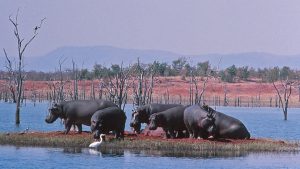
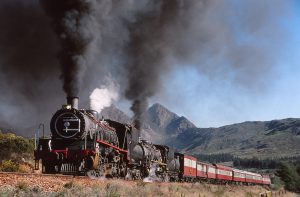
Big Beasts
8th November 2016
Every year, November is the month of Remembrance but this year it has special significance because it marks the centenary of the end of the Battle of the Somme in which more than a million men were killed or wounded, making it one of the bloodiest battles in history. It was fitting therefore that at this meeting in early-November, we heard a talk about The Great War by one of our own members, Brian Barry, whose father had fought in that conflict.
At the age of eighteen, Brian’s father had enlisted in the London Rifle Brigade and, two years later, in 1914 was sent to a sector of the Western Front in Flanders known by the British as ‘Plugstreet Wood’ (a corruption of its Flemish name, Ploegsteert). Here he was injured in early 1915 and returned home to recuperate. Later in the year he was promoted to Second Lieutenant after which he returned to fight in Flanders. After the war, he remained in the Territorial Army until 1927.
To put his father’s wartime experiences into context, Brian described several of the World War I battles including not only the Somme but also the 1917 offensive at Bullecourt where Australian forces suffered devastating losses. In the midst of all this carnage, Brian’s father was clearly fortunate to have survived the war.
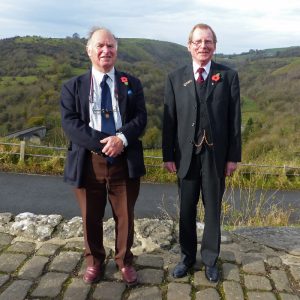
Brian Barry and Ray Smith
25th October 2016
This meeting was the AGM and the chairmanship was handed over to Ainslie Kelly who then introduced the speaker, club member Malcolm Young.
During Malcolm’s career in the armed forces he had been involved in several campaigns including Aden and Dhofar (Oman) and, with this background, he talked knowledgeably about the recent history of Yemen, a desperately poor country that has been plagued with insurgencies and civil war for the past half-century. Malcolm told us that these conflicts are rooted in numerous causes which include tribal, sectarian and political differences between the various peoples of Yemen, together with interference from the Western powers (such as the USA, Britain and France), and from Middle Eastern countries, in particular Saudi Arabia but also Jordan, Egypt and even Israel.
In 1962 Yemen, Aden and associated territories were under the control of Britain but in that year Nasser (the leader of Egypt) started to provide support for Marxist sympathisers against the ruling royal elite. Britain initially backed the Royalists but, failing to contain the insurgency, withdrew in 1967. Years of civil war followed which, now with Saudi direct involvement, shows no signs of ending. Malcolm argued that the consequences of interfering in Yemen in the 1960s should have taught lessons to the Western powers, but alas these were not learned, with the tragic results later repeated in Iraq.
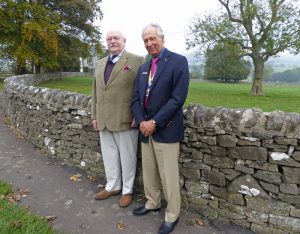
Malcolm Young and Ainslie Kelly
11th October 2016
The Portland Works was the subject of today’s talk by guest speaker Derek Morton who described how this, one of the few surviving cutlery works with a continuing history of manufacturing in Sheffield, had been saved from the threat of conversion into residential use and instead had been preserved and developed into a community owned home for traditional crafts and creative arts. The Works were opened in 1879 and, in 1914, became the birthplace of stainless steel cutlery; the material having been created the year before. Full scale stainless cutlery production was prevented by the outbreak of war and the requirement that all available stainless steel went into aero engines, but after this initial delay cutlery production was in full swing all over Sheffield by 1919 and the business prospered.
However, by the 1950s, overseas competition was taking its toll on the steel industry and Portland Works entered a period of decline and decay such that by 2009 its owners applied for planning consent to convert the buildings into apartments. At this stage a campaign was launched to save the Works and to convert it for use by small businesses. This campaign was successful and in 2013 it was purchased by a social enterprise group who, using mainly volunteer labour, have been undertaking an extensive renovation. Currently there are more than thirty small businesses within the site; approximately half of which are involved in the metalworking or woodworking trades; thus perpetuating the former nature of the work carried out here.
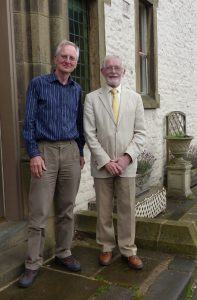
Derek Morton and Alan Grant
27th September 2016
Club member Roger Truscott took as his theme the titles of two iconic books (Silent Spring and The Sixth Extinction), published half a century apart, which tell the story of the rapid growth in awareness of our (i.e. humanity’s) disastrous impact upon the wildlife with which we share this planet.
13th September 2016
Club Treasurer David Leech related a story from the time when he had been a Police Officer in Essex. One morning he and a colleague had been called out to investigate the unusual behaviour of a public house landlord who, on the previous evening, had received a telephone call and without any explanation, had abruptly closed the bar, ejected the customers and driven away at high speed. On the morning in question, the landlord’s car was back on the premises but there was no sign of the man himself and the doors of the property were all locked. David and his colleague therefore broke into the building only to find a blood-stained knife on the bar and traces of blood elsewhere in the room and in the landlord’s private quarters. Here they were alarmed to come across a gun-locker with the gun missing and, in another room, an overturned chair and an extremely vicious looking dog. All the evidence pointed to a violent incident and they retreated to their police car to summon assistance, which duly arrived and took over at the apparent crime-scene.
It was not until later that they learned the full details of the case. The telephone call to the landlord had been an urgent summons by family members who had been involved in a traffic accident; he had returned home at a very late hour; had accidentally stabbed himself with the knife and gone for help. (And, as for the gun-locker, it was empty because the gun was away to be repaired; and the chair had been deliberately overturned to keep the dog off it!). This was an intriguing and engrossing story which was greatly appreciated by the audience.
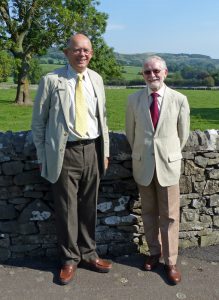
David Leech and Alan Grant
23rd August 2016
It made a welcome change for us to have a lady speaker at today’s meeting. Gill Fearn, the wife of Club member Brian, started by explaining that the lifecycle of a business can be compared to that of a person. In the natural course of events it is born, grows, matures, declines and finally dies, although these later stages may not occur in the case of a business if it experiences a merger or take-over.
Using the specific example of their Darley Dale business (Abbey Brook Cacti), Gill described how it has developed since it was set up in 1956. At that time, it was based in Sheffield but moved to its present site at Darley Dale in 1976 after which it grew rapidly, mainly through mail order including some to export markets. By then Gill and Brian needed to employ more staff and the business expanded further in the 1980s when they started to supply cacti and succulents to a number of garden centres, eventually dealing with almost 300 of these. A natural progression was then to create a garden centre themselves within the existing site and they ran this until the mid-1990s when that aspect of the business was sold. Thereafter, Abbey Dale Cacti has concentrated on growing cacti and succulents, and supplying the wholesale trade. Currently, the extensive collection of glasshouses and polytunnels at Darley Dale contains approximately 4,000 plant types.
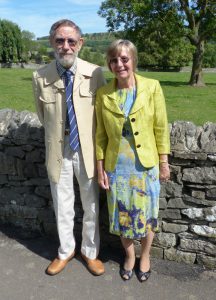
Brian and Gill Fearn
9th August 2016
By its title and in his earlier synopsis of this talk, Club member Don Mackenzie had given the impression that his life and career had been controlled by taking the line of least resistance in a number of key areas, largely (and luckily) with positive outcomes. Indeed, the first part of his talk which dealt mainly with his early life suggested that here was a very late developer, both academically and to a lesser extent in his sporting and recreational activities.
However, it became clear that once he had found the things in life that really interested him (such as his love of geology) his career really took off and he rose to occupy a senior position on the staff of the University of Derby (previously Derby College of Art & Technology). During his time there he was instrumental in the development of a computer-based system designed to test and assess the higher level skills of students in many disciplines which was eventually applied to test the competence of medical practitioners in the NHS up to Consultant level. This provided a more objective and fairer method of assessment than had previously been possible when the results of such tests could perhaps be influenced by the inconsistencies and prejudices of the person carrying out the assessment.
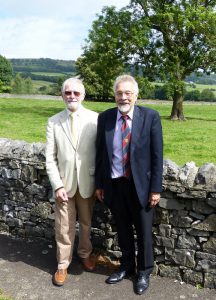
Alan Grant and Don MacKenzie
26th July 2016
The members of the club are a fairly well-travelled group of people but Ian Johnston is probably more adventurous than most in his choice of travel destinations. As a keen fisherman and bird-watcher he finds himself travelling to many unusual and remote places in pursuit of his interests and it was at this meeting that he discussed the reasons, risks and rewards involved in his journeying. Firstly, he spoke about the rationale behind his decisions for visiting places. Apart from the need to satisfy his curiosity about a country’s culture (its politics, history and customs), he considered other attractions such as its climate and its natural history.
As for risks, Ian gave a long list of these but, as he pointed out, many of them apply equally at home as abroad. However, those more often associated with foreign travel can include exotic viruses and bacteria, poisonous insects and snakes and, of course, the remoteness of the place itself. In spite of such hazards, the rewards can be amazing, with the traveller experiencing wonderful cities, stunning scenery, remarkable wildlife and a totally different way of life.
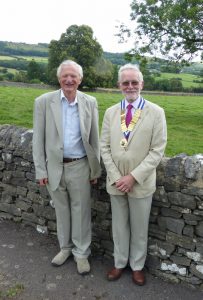
Ian Johnston and Alan Grant
12th July 2016
For his talk on this occasion, club member Robert Cumming enlisted the help of local historian, Frank Parker, to give a joint presentation on the recent history of Great Longstone. Frank showed a number of extracts from a video of Longstone village life which he had made in 2005 as a community project to record aspects of the rural economy. He also showed a film in which he had recorded the story of the concept, development and building of Thornhill House in Great Longstone. This is a care home for elderly residents of the village no longer able to live independently but who wish to remain in their own familiar village surroundings. In addition to these specific projects Frank has researched many old documents and photographs to compile a comprehensive history of much of Longstone life.
To conclude the meeting, Robert Cumming talked about the recent history of the church choir and the musical achievements of other village residents.
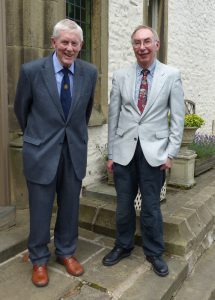
Robert Cumming and Frank Parker
28th June 2016
At this meeting our guest speaker, Dan Moss, talked about some of his experiences in the Middle East, with his musings as to what the future holds. He also discussed some of the constraints placed on the Western powers when approaching negotiation and success when tested on tribal societies.
14th June 2016
Even after more than a century the sinking of the Titanic continues to generate interest and on this occasion our guest speaker John Craike fuelled this fascination by describing the background events leading up to the tragedy, and the influence of many of the leading characters involved. He explained how the rigid class system of the day had directly and indirectly led to the situation in which so many lives had been put at risk and lost. He narrated stories of both heroic and despicable actions by individuals during and after the ship’s sinking. He finished his talk by commenting on the subsequent Board of Trade enquiry which was little more than a whitewash in which the chief culprits were mostly exonerated.
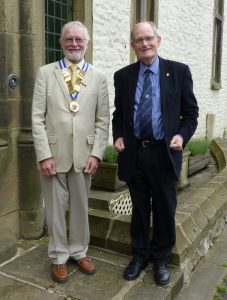
Alan Grant and John Craike
24th May 2016
Club member Kim Rainsford talked about some of his experiences as a researcher, teacher and in developing academic groups and departments in academic institutions in six countries on four continents. His research in the fields of experimental and clinical sciences has been on the effects of anti-inflammatory analgesic drugs and inflammatory-pain mechanisms.
10th May 2016
Continuing the nautical theme of a couple of meetings ago, today’s speaker club member John Robinson talked about a voyage which he had made from Southampton to Diego Garcia in the 1990s. He had been invited to join the crew of a 60-ft sailing boat “Aztec Lady” as the engineer in charge of all equipment. The purpose of the trip had been to take part in a scientific research expedition in support of the eventual setting up of the Chagos Marine Protected Area – a marine reserve in the British Indian Ocean Territory covering a sea area equivalent to twice that of the UK itself.
Diego Garcia is the largest island in the Chagos archipelago and was forcibly depopulated after the British government in the 1960s negotiated a 50-year lease with the United States for the latter to establish a military base there. With the help of video film taken throughout his voyage, John described the route and the ports visited. From Southampton Aztec Lady sailed across the Bay of Biscay, through the Mediterranean Sea, Suez Canal, Red Sea and finally out into the Indian Ocean to journey’s end at Diego Garcia, a total distance of 8,000 miles.
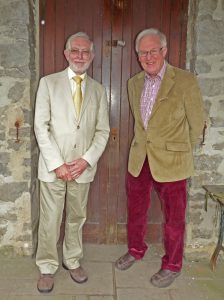
Alan Grant and John Robinson
26th April 2016
Against the background of the 2008 financial crisis and its aftermath our speaker, club member Malcolm Cameron (a former bank executive who had retired before these events occurred), described how the character of banking had changed during his career. Having started his working life in Belper, Malcolm was moved by his employers every couple of years to a different location until, in the Birmingham city office of the NatWest Bank, he became directly involved in a number of management buyouts. In these schemes, the existing managers of a company take over its ownership (with the aid of bank loans) in situations where, for example, the business would otherwise close or be divested by its parent company. From the bank’s point of view the viability of any MBO would depend primarily on the quality of the people involved and their detailed knowledge of the business.
As long as the financing arrangements were manageable these businesses thrived and Malcolm gave numerous examples of successful MBOs which he had helped to negotiate. However, in the changing circumstances of increased indebtedness towards the end of the last century many businesses found themselves overburdened with debt, and the banks and other lending institutions were exposed to unmanageable risks, with the disastrous results that we have all seen.
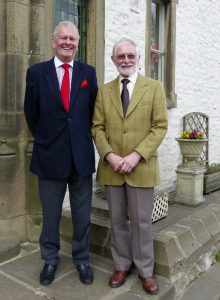
Malcolm Cameron and Alan Grant
12th April 2016
For this talk, club member Peter Coffey described the coast of Suffolk and Essex between Great Yarmouth and London, with particular emphasis on the numerous rivers which discharge from these counties into the North Sea. Starting in the north with the River Alde/Ore, he took us on a voyage which included the rivers Deben, Orwell, Stour, Colne, Blackwater, Crouch and the Thames itself. For sailors in small boats these rivers offer plentiful safe anchorages although approaching them from the sea can be difficult in unfavourable weather and tidal conditions; added to which, there are several offshore sandbanks that can present their own hazards. In times past, much of the coastal trade between East Anglia and London was in the hands of the famous Thames sailing barges whose shallow draft made them ideal vessels for these waters.
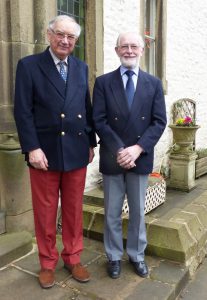
Peter Coffey and Alan Grant
22nd March 2016
A visit to the Hashemite Kingdom of Jordan was the subject of this talk given by club member John Broughton. This fascinating country contains a wide variety of historical sites including the Crusader castle at Kerak and the enormous Roman city of Jarash with its remarkably well-preserved forum, hippodrome, temples, theatre and many other buildings. In the south of the country is Petra, a UNESCO World Heritage Site of great antiquity. Described as ‘a rose-red city half as old as time’ it was built in pre-Roman times and is most notable for the structures carved into the sandstone rock cliffs that line the sides of its main valley. The modern approach to the site is through a rocky defile, known as the Siq, which at its narrowest point suddenly emerges opposite one of Petra’s most spectacular monuments, Al Khazneh (The Treasury).
In addition to visiting these major historical sites, John spent time in the country’s capital Amman and, following in the footsteps of Lawrence of Arabia, camped under the stars in Wadi Rum. This was followed by a swim in the Dead Sea, a search for Sodom and Gomorrah, and a visit to see where Jesus Christ is reputed to have been baptized in the River Jordan.
8th March 2016
For this year’s debate the club could have chosen no more topical a subject than ‘Britain and the EU: In or Out?’ The case for remaining a member of the Union was proposed by club member Roger Truscott and opposed by fellow club member John Robinson. Each of these main speakers argued his case in articulate and persuasive terms, concentrating on the basic principles and facts which will need to be considered by the British people in the forthcoming referendum. This approach was in marked contrast to the often emotive and ill-informed arguments currently being presented by some politicians and media commentators. As is now customary on such occasions, there followed a lively debate with further contributions from the floor. At the end of the debate a vote held among the audience resulted in a significant majority in favour of Britain remaining a member of the EU.
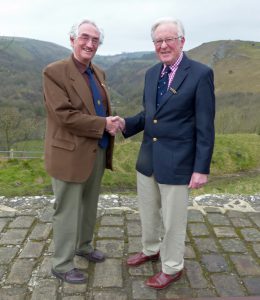
Roger Truscott and John Robinson
23rd February 2016
At this meeting we welcomed a guest speaker, the naturalist and wildlife photographer Derek Bateson who talked about the smaller and often unnoticed creatures and plants to be found in Gillfield Wood, a stretch of woodland on the outskirts of Sheffield. In only three years of studying the different species of flora and fauna in this relatively small wood, Derek had recorded a massive increase in the number of known sightings. Indeed, a very large percentage of his findings were actually new to the area, never previously having been recorded here. To accompany his talk, he showed a series of spectacular photographs whose wide-ranging subject matter included beetles and bugs, snails and slugs, spiders and flies, lichens and mosses, and many other small creatures and plants.
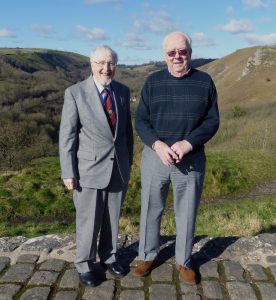
Ken Watson and Derek Bateson
9th February 2016
This talk was given by club member Peter Stubbs, who began by saying that in a criminal prosecution the most important document a defendant receives is the indictment, a concise statement of his alleged crime. This has been the practice in England since the 11th century. However, the way that indictments were resolved in the early middle ages was far from satisfactory. A defendant could face Trial by Fire or Water or, in some circumstances, could request Trial by Battle. The obvious problem with these methods was that they bore no relationship whatever to the facts of the case or to the evidence. Trial by battle fell into disuse due to its unpopularity (not least because of the risk of death or serious injury). Trial by ordeal was banned after 1200 by the Church, and trial by jury was developed in its place. However, there was no right of legal representation until 1866 and it was not until 1898 that the defendant himself was permitted to give evidence.
The modern jury system works well, although it is constantly under attack from politicians wanting to save money. Juries can and do take robust decisions when they feel it is right to do so. In 1800 there were over 200 offences that carried the death penalty and juries became reluctant to convict when they felt the penalty was too harsh. In the mid-1800s there was a substantial reduction in capital offences, essentially limiting them to cases of murder and treason. In due course, after a number of miscarriages of justice where the defendant had been wrongly convicted and hanged, the death penalty was abolished for murder in 1969 and for treason in 1998.
26th January 2016
This amazing river was the subject of a talk given by club member Roger Taylor who had been on a cruise which included sailing up the Amazon as far as the ‘City of the Forest’, Manaus. Draining an area that is 40% of the total area of South America the river, at just under 4,000 miles, is generally regarded as second only in length to the Nile. At its mouth it is so wide that, from a ship, both banks cannot be seen at the same time and the flow of fresh water discharging into the sea extends for up to 200 miles.
Having conveyed a sense of the sheer size of the river, Roger continued by describing his experiences and impressions as his ship sailed upstream, stopping at Santana to take on board a pilot and then at Santarem and Manaus. The size of the river is matched by the extent of the tropical rain-forest through which it flows, although human activity through logging (both legal and illegal) and ‘slash-and-burn’ clearance for cattle raising is having a dramatic effect. On average, 1½ acres of forest is being destroyed every second and already an area the size of France has been cleared. Also at risk from this encroachment are the indigenous peoples of the forest whose traditional way of life and intrinsic knowledge of their environment are being lost.
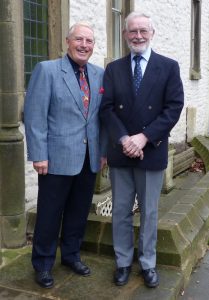
Roger Taylor and Alan Grant
12th January 2016
Today’s speaker was club member Malcolm Young who took as the title of his talk a quotation from T.E. Lawrence (Lawrence of Arabia): “Making war upon insurgents is messy and slow, like eating soup with a knife”. Insurgencies and counter-insurgency are a particular interest of Malcolm, whose career included the Parachute Regiment, the SAS and as an Army helicopter pilot, later transferring to the RAF as a ground attack and reconnaissance pilot. He had been involved in campaigns in Aden, Borneo, Burma, Northern Ireland and Dhofar (Oman), gaining first-hand experience of counter-insurgency operations.
In his fascinating and knowledgeable talk he defined insurgents as those seeking to destroy the legitimate authority of a country, and counter-insurgency as the measures taken against them. Such measures include military force but Malcolm stressed that political and economic solutions also have to be found if counter-insurgency is to be successful. In Afghanistan and Iraq, it was the failure to address the political and economic issues that has led to the emergence of the self-styled Islamic State, and the re-emergence of the Taliban.
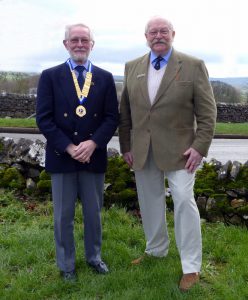
Alan Grant and Malcolm Young

© Bakewell and District Probus Club, 2014-2024